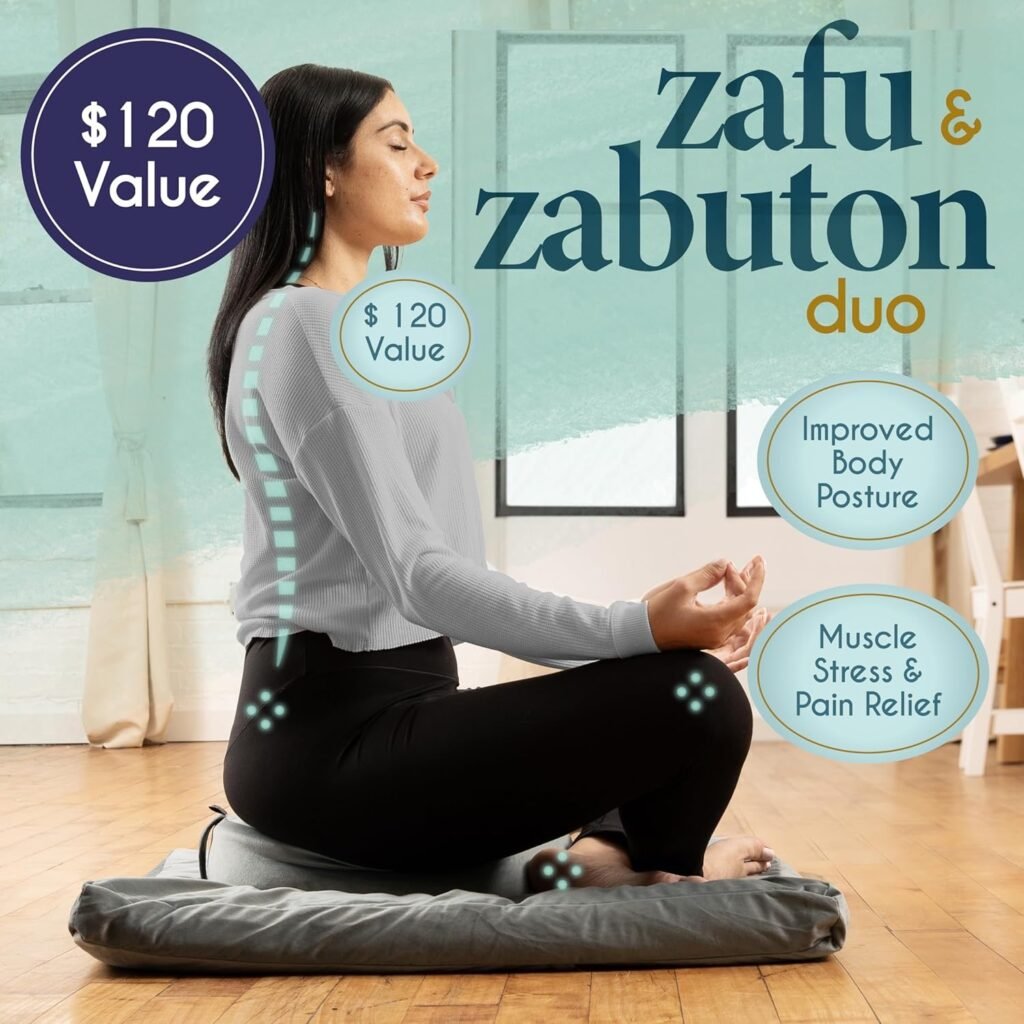Embark on a serene journey with our beginner’s guide to meditation. Discover simple techniques and reap the rewards of mindfulness.
Beginner’s Guide to Meditation: How to Start Your Journey
“The most beautiful thing in the world is, of course, the world itself.” – Wallace Stevens
This quote by Wallace Stevens shows the deep beauty meditation brings. It helps you see the beauty inside and around you. If you’re new to meditation, you’ve come to the right spot.
Meditation is an old practice that helps you focus and calm your mind. It’s not about stopping all thoughts; it’s about being mindful. For beginners, apps like the Medito Foundation are great for starting a daily meditation habit.
Key Takeaways
- Meditation is about focus, presence, and mind calming, not mind silencing.
- Mindfulness and meditation are interconnected but distinct practices.
- Regular meditation can improve both physical and mental health over time.
- Guided meditations help beginners maintain focus and establish routines.
- Starting with just a few minutes of meditation daily can develop into a lasting habit.
What is Meditation?
Meditation is a practice used by millions around the world. It helps you focus your mind to be more mindful and aware. By understanding meditation, you can easily add it to your daily life for better mental and physical health.
Definition and Purpose
Meditation is about changing your thoughts, often using your breath to stay focused. It lets you live in the moment without judging it. This brings peace and clarity to your mind.
Research shows that just 12 minutes of meditation, five days a week, can make you more attentive. Since most of our actions are done on autopilot, meditation helps you use your intentional brain. This leads to better willpower, decision-making, and less stress.
Types of Meditation
There are many types of meditation, each suited for different needs and likes. Breathing meditation uses your breath to calm you and clear your mind. Body scan meditation relaxes your body part by part.
Other types include guided meditation and simple exercises for beginners. These practices can lower stress, improve emotional health, increase focus, and even boost your immune system.
Choosing a meditation type is up to you. Start with just five to ten minutes a day and increase as you get more comfortable. Adding meditation to your daily routine can greatly benefit you.
Why Learn to Meditate?
Starting a meditation journey offers many benefits beyond just relaxing. It helps with physical, mental, and emotional health, changing life for the better. Studies show it can ease pain, lower blood pressure, and reduce anxiety and depression. It even helps slow down or stop age-related brain changes.
For beginners, knowing these benefits is a strong reason to start. Tips often include finding a quiet spot, focusing on breathing, and sticking to a routine. Many people, even those who teach meditation, find it hard to make it a daily habit. But seeing how it can change life keeps people coming back.
Simple breathing meditation can make you more aware and strong in your mind. Tools like the Insight Timer help beginners with guided sessions. Experts say even 5 to 10 minutes a day can make a big difference in health.
| Beginners Meditation Benefits | Effective Meditation Practices |
|---|---|
| Reduces Anxiety & Depression | Quiet and Comfortable Space |
| Lowers Blood Pressure | Relaxation Techniques |
| Improves Sleep Quality | Focus on the Breath |
| Enhances Creativity | Use of Meditation Apps |
| Boosts Emotional Health | Gradual Duration Increase |
By following these tips, newcomers can boost creativity, productivity, and overall well-being. Mindfulness practices, like focusing on breathing or a mantra, help you meditate better and more often.
Learning to meditate prepares you to face life’s challenges with calm and confidence. It increases self-awareness and leads to a healthier, happier life.
How to Meditate: A Step-by-Step Guide
Starting your meditation journey can be both rewarding and transformative. By using simple meditation techniques for beginners, you can make a practice that improves your daily life. Here’s a step-by-step guide to help you begin.
Finding a Comfortable Position
The first step is to find a comfortable position. Pick a quiet spot where you won’t be interrupted. You can sit in a chair with your feet on the ground or sit cross-legged on a cushion. Make sure your back is straight but not stiff. This keeps you alert and focused.
Focusing on the Breath
Next, focus on your breath. This is a simple meditation exercise to start with. Pay attention to the air moving in and out of your nostrils or the chest’s rise and fall. Focusing on the breath calms your mind and improves focus, as studies show. Begin with a few minutes and increase the time as you get more comfortable.
Dealing with Wandering Thoughts
It’s normal for thoughts to wander during meditation. Don’t get upset, just bring your focus back to your breath. Learning meditation is about accepting distractions. Redirecting your attention to your breath without judging yourself helps with patience and stress reduction over time.
| Step | Details |
|---|---|
| Finding a Comfortable Position | Choose a quiet place, sit in a comfortable posture with a straight back. |
| Focusing on the Breath | Notice the air flowing in and out or the rise and fall of the chest; gradually increase duration. |
| Dealing with Wandering Thoughts | Gently refocus on the breath without self-judgment, building patience and stress reduction over time. |
Basic Meditations for Beginners
Starting with meditation might seem hard, but it’s easy with simple exercises. Beginners often start with Breathing Meditation and Body Scan Meditation. These two techniques are great for those new to meditation.
Breathing Meditation
Breathing meditation is easy yet powerful. It focuses on your breath, helping you stay calm. This method has been around for thousands of years. Today, half a billion people meditate regularly, and many start with breathing exercises.
- Find a quiet spot where you won’t be disturbed.
- Sit comfortably with your back straight, feet flat on the floor, and hands resting on your lap.
- Close your eyes and take a few deep breaths, inhaling through your nose and exhaling through your mouth.
- Focus on the natural rhythm of your breath. Notice the sensation of air entering and leaving your nostrils.
- When your mind wanders, gently bring your focus back to your breath.
- Continue this practice for 10 to 20 minutes.
Body Scan Meditation
Body scan meditation is great for beginners too. It helps you become more aware and relaxed. This method is part of mindfulness meditation, which is over 2500 years old.
- Lie down on your back with your arms resting at your sides, palms facing up.
- Close your eyes and take a few deep breaths to relax your body.
- Start by focusing on your toes, noticing any sensations you feel.
- Slowly move your attention upward, part by part—feet, legs, hips, abdomen, chest, arms, hands, neck, and head.
- As you scan each part, acknowledge any tension, discomfort, or sensations without trying to change them.
- Complete the practice by bringing your focus back to your breathing for a few moments.
Adding these easy meditation exercises to your daily routine can lead to a life of mindfulness and peace. Remember, it takes about 40 days to make meditation a habit. Start with short sessions and increase the time as you get more comfortable.
| Meditation Technique | Benefits | Ideal Duration |
|---|---|---|
| Breathing Meditation | Enhanced focus, stress reduction | 10-20 minutes |
| Body Scan Meditation | Improved relaxation, body awareness | 10-20 minutes |
Benefits of Meditation for Beginners
Meditation is great for those just starting out. It helps both the body and mind, leading to a balanced and healthy life.
Physical Health Benefits
The physical health benefits of meditation are many and well-studied. A 2017 review of 45 studies found that it lowers stress. This leads to lower blood pressure and heart rate.
These are big wins for people with chronic conditions like heart disease and high blood pressure.
Meditation can also ease chronic pain, as seen in a 2017 study. Plus, a 2018 study showed it helps you sleep better. Good sleep is key for staying healthy and recovering well.
| Health Benefit | Supporting Study | Year |
|---|---|---|
| Reduced Blood Pressure and Heart Rate | 45 studies review | 2017 |
| Eased Chronic Pain | Meditation Study | 2017 |
| Improved Sleep | Restful Sleep Study | 2018 |
| Lower Resting Heart Rate | General Research | N/A |
Mental and Emotional Advantages
Beginners meditation benefits go beyond physical health. They bring big wins for the mind and emotions. For example, a 2018 study showed it cuts down on anxiety and emotional fatigue.
This leads to clearer thinking and more emotional stability.
It’s also good for people with PTSD, as a 2016 review found. Meditation boosts emotional well-being by reducing negative feelings. It also increases self-awareness, creativity, and patience.
This approach to mental health helps beginners live a balanced life. It encourages mindful living and betters empathy and relationships with others.
Mindfulness Practices for Beginners
Adding mindfulness to your daily life can greatly improve your well-being. By doing so, you move from an automatic life to one of intentional actions. These actions help your brain grow and strengthen areas linked to mindfulness. Try these easy exercises to see a big change in your life.
Simple Daily Mindfulness Exercises
Using mindfulness in everyday tasks can change how you think and feel. Here are some easy meditation tips for beginners to add to your day:
- Breathing Exercises: Mindful breathing is key for beginners. Try the 4-7-8 breathing to calm down and focus. Start by focusing on your breath for a few minutes daily. Pay attention to how you breathe in and out, and notice any feelings that come up.
- Mindful Walking: Walking meditations are great if sitting still is hard. As you walk, focus on how your feet touch the ground, the beat of your steps, and what’s around you. This helps you feel more connected to now.
- Body Scan Meditation: This meditation is about focusing on different body parts. Start by lying down and focus on your toes, then move up to the top of your head. It can help you relax and be more aware of your body.
- Mindful Eating: Eating mindfully means eating with full attention. Notice the food’s colors, smells, textures, and tastes. Eat slowly and enjoy each bite without distractions like TV or phones.
These easy exercises help you live more mindfully and in the moment. Make these mindfulness practices a regular part of your life, and you’ll see a big change in how you see and react to the world. Try different meditation tips to find what works best for you and fits your daily life.
Meditation Techniques for Beginners
Starting with meditation can seem daunting, but simple techniques make it easier for beginners. Guided meditation is a great way to begin.
Guided Meditation
Guided meditation is great for those who like structured guidance. An instructor or a recording helps you through a calm session. You start with a few minutes a day and can increase as you get more comfortable.
- Choose a Guided Meditation: Look for trusted sources like Calm, Headspace, or Insight Timer. They have sessions for different needs and goals.
- Set a Reminder: Make meditating a daily habit by setting a reminder in the morning.
- Sit Comfortably: Start by sitting in a relaxed way. Don’t worry about how you sit.
- Focus on Breathing: Count your breaths up to ten or listen to the guide to stay focused.
- Embrace Wandering Thoughts: It’s normal for your mind to wander. Just gently bring your focus back without judging yourself.
- Extend Compassion: Treat any thoughts or feelings you have during the session with kindness.
Guided meditation makes starting meditation easy and supportive. It gives clear directions, helping you become more aware and present. This method is perfect for beginners, helping you build a strong meditation habit.
Tips and Tricks: Meditation Success
Starting your meditation journey can be rewarding and challenging. Success often depends on being consistent and finding practices that fit your life. Here are some valuable meditation tips for newcomers to help you begin.
Developing a Routine
Creating a meditation routine is key for success. Begin with just two minutes a day for a week, then slowly increase the time. This gradual increase helps you build a routine that fits easily into your day.
Being consistent is important. Set reminders to meditate, use apps like the Peloton App for guided sessions, or add short meditation breaks to your workday. A simple way to keep your focus is counting breaths up to 10.
Before starting your session, check in with yourself. Noting how you feel can deepen your practice and help with emotional control. Experts suggest keeping up with your routine for at least a month to make it a habit.
| Step | Action |
|---|---|
| 1 | Start with brief sessions (2 minutes for the first week) |
| 2 | Gradually increase the duration |
| 3 | Use meditation apps for guidance |
| 4 | Set daily reminders |
| 5 | Commit to at least a month |
| 6 | Include self-awareness check-ins |
If sitting meditation isn’t your thing, try walking meditations or progressive muscle relaxation. These options help you find a method that improves your focus and emotional health.
Whether you meditate alone or with others, finding consistent practices that suit you is crucial. End each session with a smile, celebrating your progress and feeling grateful.
Common Challenges and How to Overcome Them
Starting a meditation journey can be rewarding but also challenging. Many beginners face issues like distraction, physical discomfort, and doubts about their practice’s effectiveness. But, these obstacles can be overcome with some helpful strategies.
Distractions: External noise or internal thoughts can disrupt your practice. Create a quiet space for your meditation. Remember, it’s normal for your thoughts to wander. When you notice this, gently bring your focus back to your breath.
Physical Discomfort: Sitting still can cause tension or pain. Make sure you sit comfortably, whether on a cushion, chair, or lying down. Adjust your position while staying aware of your body to ease discomfort.
Strong Emotions: You might feel strong emotions like anger, frustration, or sadness during meditation. Accept these feelings without judgment and let them go naturally. This approach of non-judgmental awareness can deepen your meditation.
| Meditation Obstacle | Solution |
|---|---|
| Falling Asleep | Try meditating with your eyes open slightly or choosing a position where you’re less likely to doze off. |
| Overanalyzing | Practice accepting the present moment without trying to interpret or judge your thoughts. |
| Time Constraints | Start with 5-minute sessions and gradually increase the duration as you build consistency. |
Facing Self-Doubt: Beginners might question if their meditation is effective. Remember, there’s no right or wrong way to meditate. The journey is personal, and what’s important is your dedication to it. Apps, guided meditations, and timers can help you stay on track.
By facing and overcoming these challenges, you can make your meditation practice more fulfilling and consistent. Remember, dealing with obstacles is part of the journey. It leads to greater self-awareness and overall well-being.
Conclusion
Starting your meditation journey is a big step towards finding yourself and living mindfully. You’ve learned about meditation’s basics, like its nature and different techniques like breathing and body scan meditation. You’ve also learned how to overcome common challenges.
This guide shows that meditation is more than just sitting still. It’s about building a deeper sense of calm and presence in your everyday life.
Studies from places like Princeton University and the University of Maryland School of Medicine highlight meditation’s benefits. These benefits range from better physical health to improved mental and emotional well-being. This proves the value of being consistent and patient with your practice.
By making meditation a regular part of your life, you’re setting the stage for deep personal growth. Simple mindfulness exercises can be added to your daily routine, helping you grow.
Remember, the aim of mindfulness isn’t to be perfect. It’s about finding peace in the journey. Meditation means sitting with an open heart, letting thoughts go by, and coming back to your breath.
Whether you sit in a chair, practice Zazen with your eyes open, or find another comfortable position, each session brings you closer to a balanced life. There are many ways to meditate, so explore and find what works for you. Let this journey enrich your life and deepen your connection to the present moment.
FAQ
What is meditation and its purpose?
Meditation is about focusing your mind to be more mindful and aware. It helps you pay attention to the present moment without judging it.
What types of meditation are available for beginners?
Beginners can try simple breath meditation, body scan meditation, or guided meditations. These methods help train your mind and keep you focused on the now.
Why should beginners learn to meditate?
Meditation can reduce stress, improve focus, and make you feel emotionally stronger. It helps you handle life’s ups and downs and builds mental toughness.
How can a beginner start meditating?
Start by finding a quiet spot to sit and focus on your breathing. Begin with short sessions and slowly increase the time. If your mind drifts, gently bring it back to your breath without judging yourself.
What is breathing meditation?
Breathing meditation means focusing on your breath. You might count your breaths to keep your attention sharp. It’s a great way to be more mindful and aware of the present.
How does body scan meditation work?
In body scan meditation, you pay attention to different parts of your body. This helps you relax and become more aware. It’s a simple way to improve mindfulness.
What are the physical health benefits of meditation?
Meditation can lower stress, boost your immune system, and help you sleep better. These benefits improve your overall health.
What are the mental and emotional advantages of meditating?
Meditation reduces mind chatter, sharpens focus, and betters emotional health. It leads to a balanced life and helps you connect with others more mindfully.
How can beginners incorporate mindfulness into their daily lives?
Start with simple mindfulness exercises like deep breathing or walking mindfully. These activities encourage you to live more intentionally and can make mindfulness a part of your daily routine.
What is guided meditation and how can it help beginners?
Guided meditation uses a teacher or recording to guide you through meditation with imagery or relaxation steps. It’s great for beginners who want structured help.
How can beginners develop a successful meditation routine?
Stick to a regular schedule. Choose the best time and make a special spot for meditation. Use apps or reminders to help you remember to meditate daily.
What are common challenges beginners face in meditation and how can they overcome them?
New meditators might find it hard to focus, feel uncomfortable, or doubt their progress. Overcome these by adjusting your position for comfort, accepting that your mind will wander, and setting realistic goals.
Source Links
- https://www.onepeloton.com/blog/beginner-meditation/
- https://mindworks.org/blog/beginners-guide-meditation/
- https://leftbrainbuddha.com/starting-a-meditation-practice/
- https://www.mindful.org/how-to-meditate/
- https://www.headspace.com/meditation/meditation-for-beginners
- https://www.linkedin.com/pulse/beginners-guide-meditation-amy-pattee-colvin
- https://www.yogajournal.com/article/practice-section/presence-of-mind/
- https://www.pureyoga.com.au/meditation/why-meditation/
- https://www.lionsroar.com/how-to-meditate/
- https://www.nhs.uk/every-mind-matters/mental-wellbeing-tips/how-to-meditate-for-beginners/
- https://www.businessinsider.com/guides/health/mental-health/how-to-meditate
- https://www.artofliving.org/us-en/meditation/beginners-guide/meditation-for-beginners
- https://www.gaiam.com/blogs/discover/meditation-101-techniques-benefits-and-a-beginner-s-how-to
- https://psychcentral.com/health/meditation-for-beginners
- https://www.mayoclinic.org/tests-procedures/meditation/in-depth/meditation/art-20045858
- https://www.mindful.org/meditation/mindfulness-getting-started/
- https://www.charliehealth.com/post/a-beginners-guide-to-mindfulness-practices
- https://positivepsychology.com/meditation-techniques-beginners/
- https://zenhabits.net/meditation-guide/
- https://www.verywellmind.com/different-meditation-techniques-for-relaxation-3144696
- https://insighttimer.com/blog/meditation-techniques-for-beginners/
- https://www.headspace.com/meditation-101/trouble-meditating
- https://mindfulnessexercises.com/meditation/beginners/
- https://thedailyzen.org/2015/03/24/beginners-guide-to-meditation/
- https://adaringadventure.com/a-beginners-guide-to-meditation/








